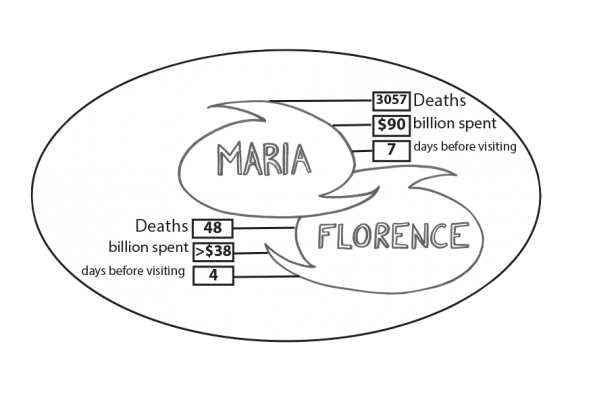Trump and the Hierarchy of Hurricanes
October 10, 2018
According to the National Oceanic and Atmospheric Administration, hurricane season officially ends in November, but the storm of public controversy has only just begun. As we face an increasing number of major storms in quick succession, many of them are direct results of global warming. How we and our government respond is key to the safety and security of our people and, ultimately, our nation.
That our government should perform disaster relief quickly, effectively and without bias is an expectation so basic it should even not have to be said. Hurricanes are life-threatening, fires are unflaggingly destructive, earthquakes can ruin lives and the government ought to protect its people from all of these things.
Or so one would think.
President Trump’s handling of disaster relief has never been great, from telling people in a storm shelter after Hurricane Harvey to “have fun,” to throwing paper towels into a crowd while distributing supplies in Puerto Rico, and even recently calling the number of people declared dead by Hurricane Maria “lies” spread by Democrats for their political gain. His various gaffes, improprieties and lack of compassion absorb media attention and public outrage, distracting Americans from the very real suffering survivors are experiencing and hindering disaster relief efforts.
The height of this incompetence was reached with Hurricane Maria in 2017. It is clear, through both his words and his actions, that Trump is biased against and ignorant of the struggles faced by Puerto Rico and the other territories impacted by Maria.
The Trump administration barely prepared Puerto Rico for the hurricane. The Federal Emergency Management Agency (FEMA) waited weeks to dedicate their full resources to it. After the storm, the Puerto Rico Electric Power Authority (PREPA) awarded a $300 million contract to restore electricity to Puerto Rico to Whitefish Energy, a small Montana-based company with two employees, zero experience, and one investor who prominently supported Trump during his 2016 campaign.
The good news is that after a full 11 months, electricity has been completely restored to Puerto Rico and life is slowly but surely returning to normal. This has come at the cost of more than 300,000 Puerto Ricans forced to emigrate to Florida, $90 billion in damage and tarnished American prestige the world over.
Now let’s contrast this with Hurricane Florence. The affected states were prepared early and adequately. FEMA and the army dedicated their full resources to helping the states get ready. Though reconstruction is just starting, it looks promising as responders are moving quickly. Trump has even refrained from misinformed claims and/or shameless lies about Hurricane Florence.
What a world of difference.
This is not to belittle either or to declare which hurricane was worse — one of the few things the entire American population agrees on in 2018 is that hurricanes are, by their very nature, bad. Each should be given an adequate and humane response. The Trump administration’s simultaneous blatant dismissal of and peculiar obsession with Hurricane Maria lends neither. The people affected by Hurricane Florence deserve help; however, that shouldn’t stand in mutual exclusion with the people (still) affected by Hurricane Maria.
It seems to be more than an unfortunate coincidence that Trump won the majority of the states Hurricane Florence hit (Virginia being the only exception). Meanwhile, Puerto Rico is unable to take part in the presidential electoral process.
In the wake of Hurricane Maria, the people of Puerto Rico, the U.S. Virgins Islands and other territories affected deserved better. Every American deserves better.











